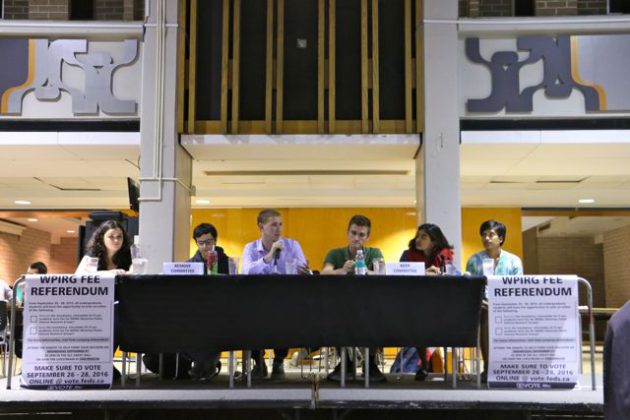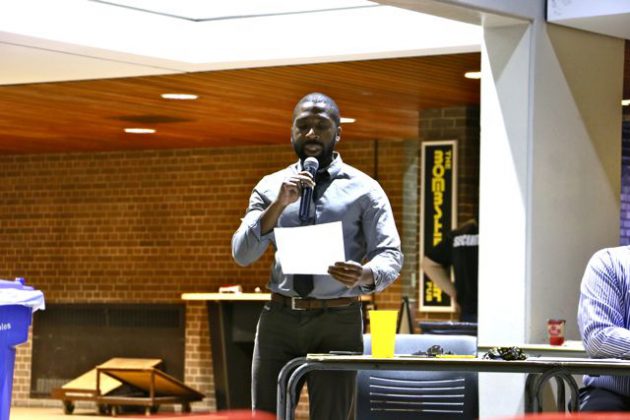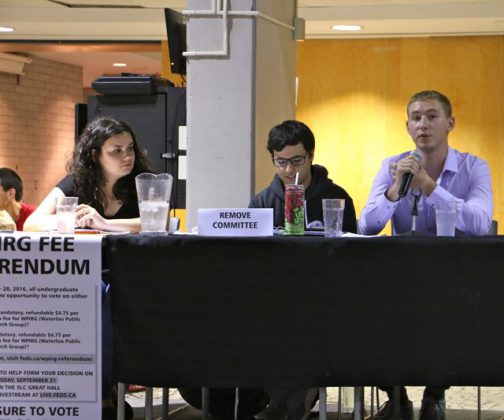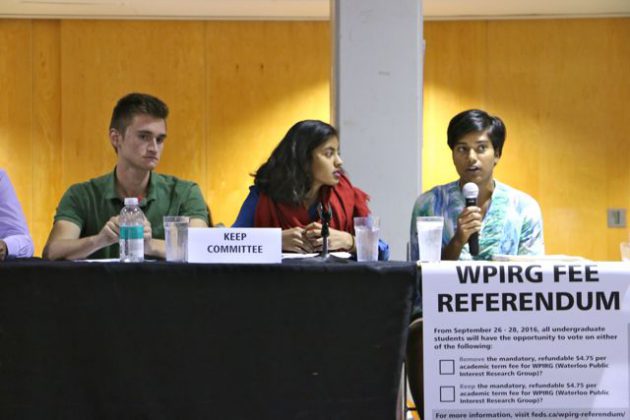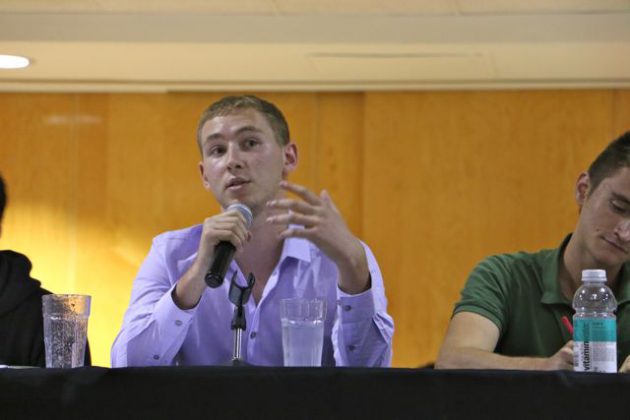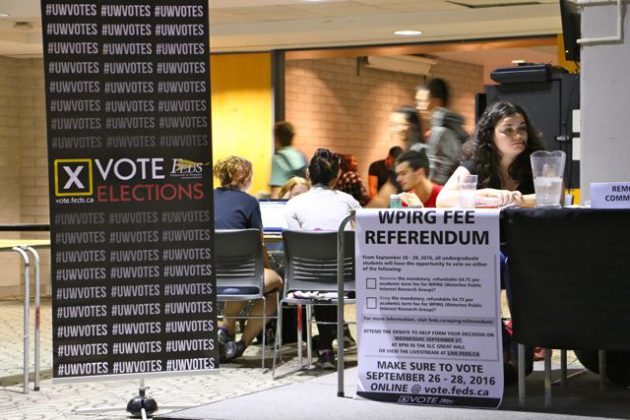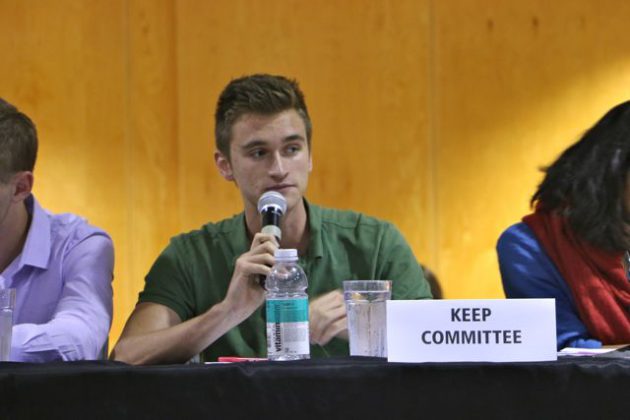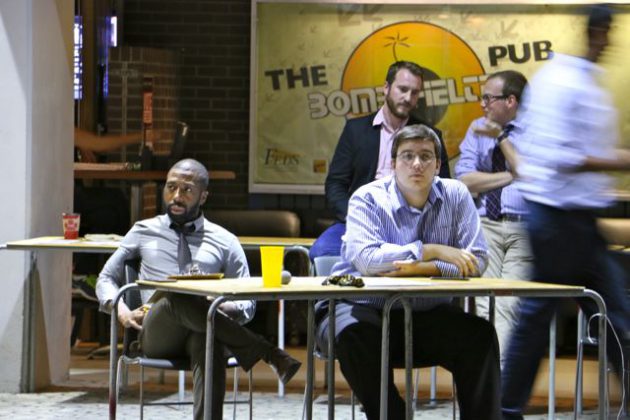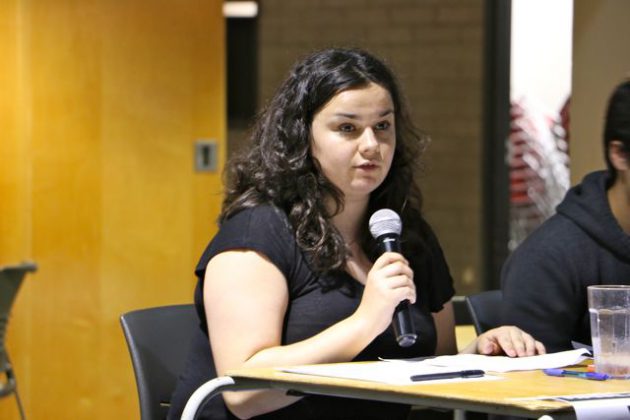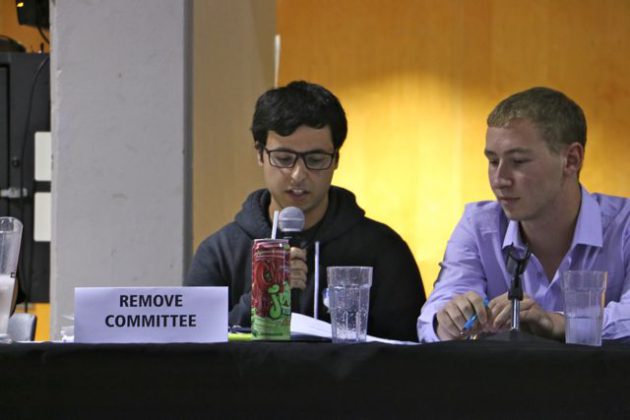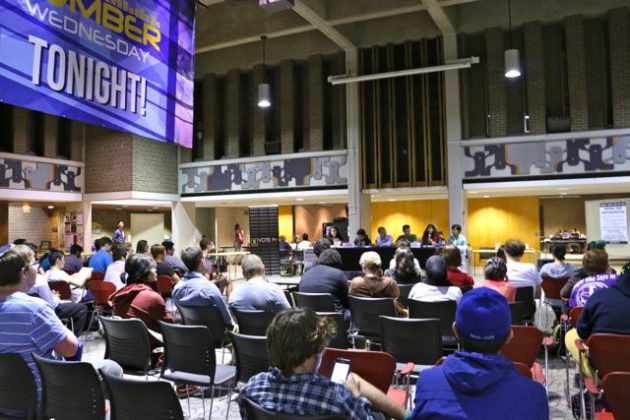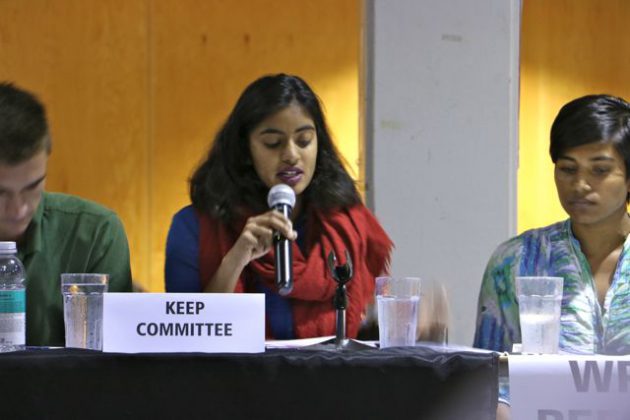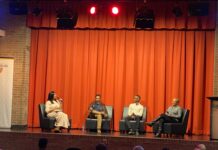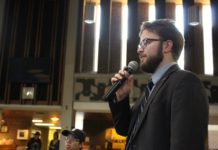The Keep/Remove WPIRG committees went head-to-head at the SLC Great Hall for the WPIRG referendum debate.
The debate, which took place Sept. 21, consisted of the two committees deliberating on whether the non-profit organization WPIRG should have an opt-in fee for students — rather than the mandatory $4.75 opt-out fee. Approximately 50 audience members were present, including Feds President Chris Lolas.
Feds research and policy officer Aaron Francis played the role as moderator and opened the debate with the following question:
“Since 1973, WPIRG has received an automatic per term fee from the undergraduates of UW. Today that fee stands at $4.75 per term. What are the advantages and/or disadvantages of no longer making this fee automatic?”
The Keep WPIRG committee began with their opening statement, providing a brief description and history of what the organization is about and why the mandatory fee should continue.
“WPIRG is a diverse community of students working together to research, educate, and take action to create meaningful change on campus and in the community” said Keep committee member Swetha Kulandaivelan. “It is a vital part of campus life that collaborates with student clubs and services to uphold our shared values and vision of a more inclusive and sustainable future.”
Kulandaivelan also listed ways in which WPIRG helped UW students over the years, such as their mental health campaigns, implementing recycling in the Waterloo region, and fighting against international student tuition hikes, along with their collaborations with other student societies and organizations, such as the UW Aboriginal Student Association, UW Black Association for Student Expression and the UW Glow Centre.
Marcus Abramovitch of the Remove committee began with an opening statement that reiterated what the committee was representing.
“There’s probably a lot of confusion out here … this debate is not about taking WPIRG off campus. That’s not what the Remove side is doing … we’re removing the automatic fee for students,” Abramovitch said.
Abramovitch continued by emphasizing the Remove side’s main argument: “You shouldn’t be a student to be a part of an organization before you decide [whether or not] you want to be a part of [it].”
The Remove committee ended their opening statement by also mentioning the lack of transparency of WPIRG’s financial accounts and the percentage of student fees that are going towards the organization’s full-time staff.
When debating on what the advantages or disadvantages would be in removing the mandatory fee, the Keep committee highlighted some of the concerns that the Remove committee had on WPIRG.
“I think it’s essential to recognize that though as a UW student you might not be presently aware of the work we do … a lot of the work we do is kind of behind the scenes and involves students that may not necessarily be as heard or as vocal or visible on campus,” said Keep committee member Abram Braithwaite. “Our main goal is to encourage students to become educated, to empower students, and to really challenge and criticize and think critically.”
Shalaka Jadhev of the Keep committee said that the committee does admit that they do understand why some students feel there is a lack in the organization’s visibility.
“The reason that we’re maybe less visible than other organizations is because we focus our money on programming as well as outreach,” said Jadhev.
Jadhev mentioned that WPIRG made an effort in listening to students’ input and are implementing their feedback into their future and current campaigns, like the mental health campaign that started Sept. 15. “We want to continue having very open, visible events,” Jadhev said.
The Keep committee also addressed the issue of how the mandatory student fee is used within the organization, which is a main concern of the Removal committee and students.
“WPIRG spends most of their money not only on campus but in our direct student community. This acts as a bridge between students on and off campus,” said Jadhev.
In terms of staff salaries, the Keep committee claimed that they spent 46 per cent of their revenue towards staff this year, which includes two full-time members, a four month co-op student, and an 11-week research staff.
Before the Remove committee answered the main question of the debate, they first rebutted some of the statements made from the opposing committee.
“Similar non-profits only take 20-40 per cent on salaries, nowhere near the 70-85 per cent that WPIRG takes today,” said Remove committee member Justin Paulin.
Paulin also mentioned how the programs and events organized by WPIRG are not well attended considering how many students pay for them and how they’ve even received some criticism for collaborating with action groups, mainly their work in the Schembri and Icon housing situations.
“Food not Bombs has actually condemned you at your most recent annual general meeting … and most recently online in a comment,” Paulin said. “For Schembri, you redirected [students] to a free legal service, and for Icon, you’ve been providing contracts that [aren’t] valid for most people who aren’t in group leases.”
The Remove committee spoke about the advantages of removing the mandatory $4.75 fee, such as giving students a choice whether or not to pay a membership fee, and avoiding the difficulties of getting refunds, which they have to go through now with the opt-out fee.
“Students who don’t know about WPIRG, don’t have to pay the fee…. Students pay a lot for tuition and adding on all these little extras. By getting rid of WPIRG’s, it will set an example,” Paulin said.
Abramovitch continued Paulin’s point. “Taking away the automatic fee will force WPIRG to be accountable to students and they won’t be able to profit off of student ignorance,” said Abramovitch. “WPIRG has sort of enjoyed this position where the less students know about them, the less students get their refund, and therefore the more money they have.”
Heather Bone of the Remove committee went on to add that students having the right to choose to opt-in to WPIRG would give them a more accurate representation of the organization.
“If the fee is made voluntary, WPIRG could in better conscience make whatever political stances that they wanted because they would have certainty that their members supported these stances,” said Bone.
Both committees had to respond to pre-submitted questions from the opposing committee.
When asked why UW students’ money went to other schools’ public research groups through equalization fees instead of being spent on campus, Jadhev of the Keep committee responded by explaining how the organization uses the student fees.
“It’s really important to note that the work that these PIRGs do is very difficult … these staffs are tirelessly working … they actually don’t get paid incredible amounts … they get paid starting at 22 dollars and nine cents [an hour],” said Jadhev. “For a full-time job, that’s pretty standard.”
Jadhev went on to state the importance of investing in other PIRGs as well. “It’s important to recognize that the work that these various PIRGs are doing is really essential and also very connected…. We are very community-based, not only in our students but also throughout….Your problems are someone else’s and we [universities] need to stay connected.”
The Keep committee added that about nine per cent of student funding goes towards savings, which are invested in UW students as well.
When asked if Feds was expected to take over the support WPIRG does for student clubs should it cease to exist, Abramovitch of the Remove committee responded by reiterating some previous statements that both committees had said.
“We’re not defunding [WPIRG] … again, WPIRG will still remain to exist. They’ve got lots of money in the bank because of their ‘savings plan,’” Abramovitch said. “They’ve got $75,000 in savings, and they can easily survive if they wanted to.”
“There already is an opt-in system,” Abramovitch continued. “WPIRG has committee members that donate voluntarily to their cause … students can easily participate that way, and this idea that opt-in will kill WPIRG and that it’s essentially a defund is nonsense. I wish WPIRG would stop perpetuating this myth.”
Abramovitch further added that most of the funds that minority groups actually have do not come from WPIRG, and that Feds could easily cover WPIRG’s funding with their fee. Paulin of the Remove committee added that the organization can create their own funds in other ways, instead of obtaining funds from students.
“If they want funding, they can run a fundraising event. If they run a fundraising event, people who support them will give them money,” said Paulin. “Why should it be that this little minority on campus can decide where $250,000 every year goes towards for all these little groups that obviously can’t find money anywhere else?”
When asked why students should be presumed members of WPIRG if the organization is in no way affiliated with UW or Feds, Jadhev of the Keep committee responded by emphasizing the need for the organization to be independent.
“We’re actually incredibly proud to be an independent organization,” said Jadhev. “All of us hope that our governments are accountable and transparent … the way that governments are accountable and transparent is when they have independent organizations checking and balancing that.”
“If WPIRG is proud to be independent, they need to pay for themselves,” Abramovitch later said. “If they want to separate from UW and if they want to be separate from Feds, let’s let them and let’s not let them take money from UW students.”
Jadhev went on to say how public interest for the organization is key to surviving. “We ask the difficult questions and we use creative problem solving … we’re arguably not only a student group deeply rooted in the public interest, but pursuing it in an innovative manner, in the spirit of UW after all.”
When asked why there is criticism for WPIRG spending more money off campus than on campus if students live outside of campus, Abramovitch of the Remove committee responded by rebutting some of the statements made by the Keep committee.
The Remove committee clarified that when they referred to WPIRG’s “off-campus” spending, they meant outside of K-W, rather than just off of the UW campus.
Abramovitch was briefly interrupted by a Keep committee supporter Jessica Dineen, who began to play “Ode to Joy” on a flute. Feds President Chris Lolas and security quickly handled the situation.
When the closing statements came along the Keep committee made some rebuttals towards some of the statements from the Remove committee.
“I also want to point out that our mental health support … has been ongoing not only at an institutional level, but also between students,” Jadhev said. “I think this idea of recent issues is actually really key … because we’re reacting dynamically to the student needs.”
Along with sharing some stories on how WPIRG has impacted their lives at UW, The Keep committee emphasized the need for the automatic fee to exist in order to continue doing their social justice projects.
“We need this fee to survive. If there is no fee, there is no WPIRG,” Jadhev said.
The Remove committee began their closing statements by reiterating that they are not trying to defund the organization and that WPIRG can find other ways to obtain funds in order to continue existing. “WPIRG will continue to exist, they will simply have to do so by getting support of students, rather than the ignorance of students,” said Abramovitch.
The Remove committee went on to mention how some of the projects WPIRG has been working on have failed.
“Nothing has happened on international tuition,” Abramovitch said when mentioning how WPIRG has attempted to protest against international tuition hikes. “WPIRG said they went to a meeting and now it’s kind of been dropped, and [focusing] on some other issues now.… Nothing is really being continued on that, this idea of continuity is so necessary … getting things done requires policy, getting things done requires getting involved in Feds and changing something from within.”
The referendum on WPIRG’s fee will take place from 10 a.m. Sept. 26 to 10 p.m. Sept. 28. The results will be announced Sept. 29 at a to-be-decided location.
To watch the live stream of the referendum debate, click here.
























